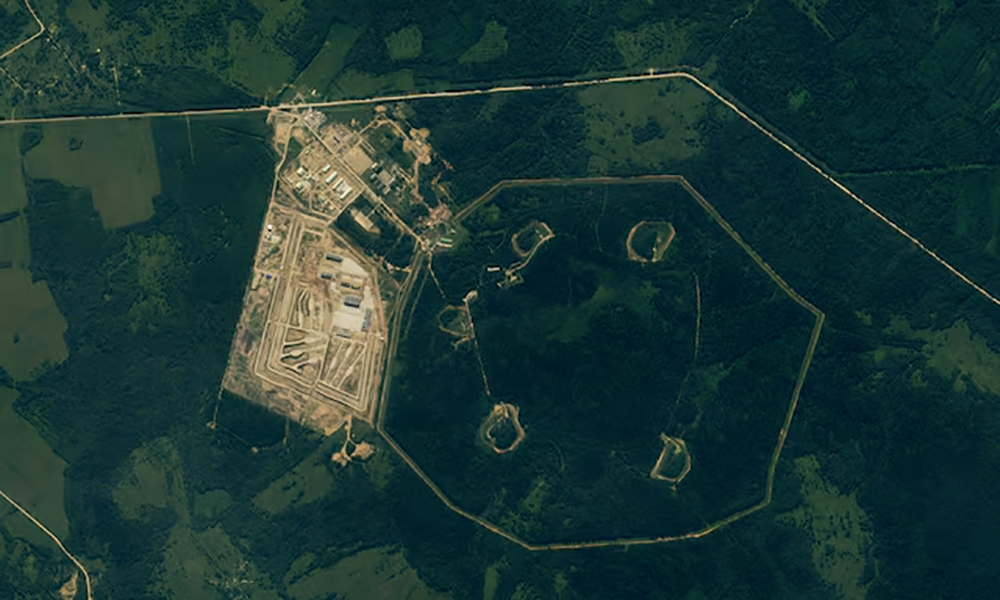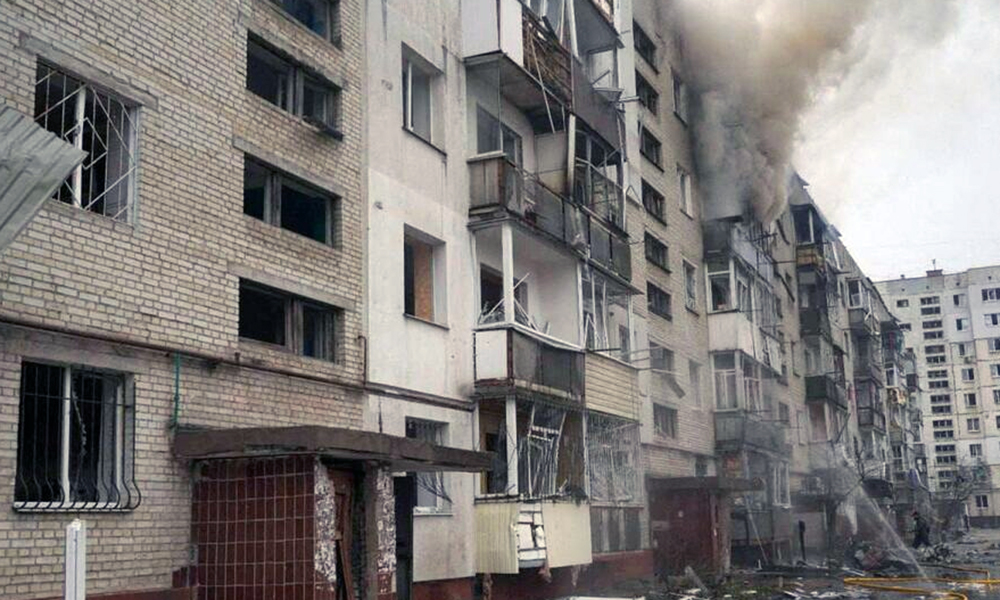World
US researchers find probable launch site of Russia’s new nuclear-powered missile
A Kremlin spokesman said these were questions for the defence ministry and declined further comment.

Two U.S. researchers say they have identified the probable deployment site in Russia of the 9M370 Burevestnik, a new nuclear-powered, nuclear-armed cruise missile touted by President Vladimir Putin as “invincible.”
Putin has said the weapon – dubbed the SSC-X-9 Skyfall by NATO – has an almost unlimited range and can evade U.S. missile defenses. But some Western experts dispute his claims and the Burevestnik’s strategic value, saying it will not add capabilities that Moscow does not already have and risks a radiation-spewing mishap.
Using images taken on July 26 by Planet Labs, a commercial satellite firm, the two researchers identified a construction project abutting a nuclear warhead storage facility known by two names – Vologda-20 and Chebsara – as the new missile’s potential deployment site. The facility is 295 miles (475 km) north of Moscow.
Reuters is the first to report this development.
Decker Eveleth, an analyst with the CNA research and analysis organization, found the satellite imagery and identified what he assessed are nine horizontal launch pads under construction. They are located in three groups inside high berms to shield them from attack or to prevent an accidental blast in one from detonating missiles in the others, he said.
The berms are linked by roads to what Eveleth concluded are likely buildings where the missiles and their components would be serviced, and to the existing complex of five nuclear warhead storage bunkers.
The site is “for a large, fixed missile system and the only large, fixed missile system that they’re (Russia) currently developing is the Skyfall,” said Eveleth.
Russia’s defense ministry and Washington embassy did not respond to a request to comment on his assessment, Burevestnik’s strategic value, its test record and the risks it poses.
A Kremlin spokesman said these were questions for the defence ministry and declined further comment.
The U.S. State Department, the CIA, the Office of the Director of National Intelligence and the U.S. Air Force National Air and Space Intelligence Center declined to comment.
The identification of the missile’s probable launch site suggests that Russia is proceeding with its deployment after a series of tests in recent years marred by problems, said Eveleth and the second researcher, Jeffery Lewis, of the Middlebury Institute of International Studies at Monterey.
Lewis agreed with Eveleth’s assessment after reviewing the imagery at his request. The imagery “suggests something very unique, very different. And obviously, we know that Russia is developing this nuclear-powered missile,” he said.
Hans Kristensen of the Federation of American Scientists, who also studied the Vologda imagery at Eveleth’s request, said that it appears to show launch pads and other features “possibly” related to Burevestnik. But he said he could not make a definitive assessment because Moscow does not typically place missile launchers next to nuclear warhead storage.
Eveleth, Lewis, Kristensen and three other experts said Moscow’s normal practice has been stockpiling nuclear payloads for land-based missiles far from launch sites – except for those on its deployed Intercontinental Ballistic Missile (ICBM) force.
But deploying the Burevestnik at Vologda would allow the Russian military to stockpile the nuclear-armed missiles in its bunkers, making them available to launch quickly, said Lewis and Eveleth.
Deputy Foreign Minister Sergei Ryabkov said Russia will make changes to its guidelines on the use of nuclear weapons in response to what it regards as Western escalation in the war in Ukraine, state news agency TASS reported on Sunday.
POOR TEST RECORD
A 2020 report by the United States Air Force’s National Air and Space Intelligence Center said that if Russia successfully brought the Burevestnik into service, it would give Moscow a “unique weapon with intercontinental-range capability”.
But the weapon’s checkered past and design limitations raised doubts among eight experts interviewed by Reuters about whether its deployment would change the nuclear stakes for the West and other Russian foes.
The Burevestnik has a poor test record of at least 13 known tests, with only two partial successes, since 2016, according to the Nuclear Threat Initiative (NTI), an advocacy group focused on reducing nuclear, biological and emergent technology risks.
The setbacks include a 2019 blast during the botched recovery of an unshielded nuclear reactor allowed to “smolder” on the White Sea floor for a year following a prototype crash, according to State Department.
Russia’s state nuclear agency Rosatom said five staff members died during the testing of a rocket on Aug. 8. Putin presented their widows with top state awards, saying the weapon they were developing was without equal in the world, without naming the Burevestnik.
Pavel Podvig, a Geneva-based expert on Russia’s nuclear forces, Lewis, Eveleth, and other experts said it will not add capabilities that Moscow’s nuclear forces already do not have, including the ability to overwhelm U.S. missile defenses.
Moreover, its nuclear-powered engine threatens to disgorge radiation along its flight path and its deployment risks an accident that could contaminate the surrounding region, said Cheryl Rofer, a former U.S. nuclear weapons scientist and other experts.
“The Skyfall is a uniquely stupid weapon system, a flying Chernobyl that poses more threat to Russia than it does to other countries,” agreed Thomas Countryman, a former top State Department official with the Arms Control Association, referring to the 1986 nuclear plant disaster.
NATO did not respond to questions about how the alliance would respond to the weapon’s deployment.
Little publicly is known about the Burevestnik’s technical details.
Experts assess that it would be sent aloft by a small solid-fuel rocket to drive air into an engine containing a miniature nuclear reactor. Superheated and possibly radioactive air would be blasted out, providing forward thrust.
Putin unveiled it in March 2018, saying the missile would be “low flying,” with nearly unlimited range, an unpredictable flight path and “invincible” to current and future defenses.
Many experts are skeptical of Putin’s claims.
The Burevestnik, they say, could have a range of some 15,000 miles (23,000 km) – compared to more than 11,000 miles (17,700 km) for the Sarmat, Russia’s newest ICBM – while its subsonic speed would make it detectable.
“It’s going to be as vulnerable as any cruise missile,” said Kristensen. “The longer it flies, the more vulnerable it becomes because there is more time to track it. I don’t understand Putin’s motive here.”
The Burevestnik’s deployment is not banned by New START, the last U.S.-Russian accord limiting strategic nuclear weapon deployments, which expires in February 2026.
A provision allows Washington to request negotiations with Moscow on bringing the Burevestnik under the caps but a State Department spokesperson said no such talks had been sought.
Citing the war in Ukraine, Russia has spurned U.S. calls for unconditional talks on replacing New START, stoking fears of an all-out nuclear arms race when it expires.
Podvig said Moscow might use the missile as a bargaining chip if talks ever resume.
He called the Burevestnik a “political weapon” that Putin used to bolster his strongman image before his 2018 re-election and to telegraph to Washington that it cannot dismiss his concerns over U.S. missile defenses and other issues.
World
Secretive Chinese network tries to lure fired US federal workers, research shows
Researcher identifies “network of fake consulting and headhunting firms”

A network of companies operated by a secretive Chinese tech firm has been trying to recruit recently laid-off U.S. government workers, according to job ads and a researcher who uncovered the campaign, Reuters reported Wednesday.
Max Lesser, a senior analyst on emerging threats with the Washington-based think tank Foundation for Defense of Democracies, said some companies placing recruitment ads were “part of a broader network of fake consulting and headhunting firms targeting former government employees and AI researchers.”
Little information is publicly available on the four consultancies and recruitment companies allegedly involved in the network, which in some cases shared overlapping websites, were hosted on the same server, or had other digital links, according to Reuters’ reporting and Lesser’s research.
The four companies’ websites are hosted at the same IP address alongside Smiao Intelligence, an internet services company whose website became unavailable during Reuters’ reporting.
Reuters could not determine the nature of the relationship between Smiao Intelligence and the four companies.
The news agency’s attempts to track down the four companies and Smiao Intelligence ran into numerous dead-ends including unanswered phone calls, phone numbers that no longer work, fake addresses, addresses that lead to empty fields, unanswered emails and deleted job listings from LinkedIn.
Lesser, who uncovered the network and shared his research with Reuters ahead of publication, said the campaign follows “well-established” techniques used by previous Chinese intelligence operations.
“What makes this activity significant,” he said, “is that the network seeks to exploit the financial vulnerabilities of former federal workers affected by recent mass layoffs.”
Reuters could not determine if the companies are linked to the Chinese government or whether any former federal workers were recruited.
Asked about the research, three intelligence analysts told Reuters the network appeared to be a prime example of how foreign-linked entities are trying to gather intelligence from staff fired or forced into retirement by President Donald Trump and billionaire tech tycoon Elon Musk’s Department of Government Efficiency.
A spokesperson for the Chinese Embassy in Washington told Reuters in an email that China was unaware of any of the entities allegedly involved in the campaign and Beijing respects data privacy and security.
A White House spokesperson said China was constantly trying to exploit the United States’ “free and open system” through espionage and coercion.
“Both active and former government employees must recognize the danger these governments pose and the importance of safeguarding government information,” the spokesperson said.
One of the companies in the network, RiverMerge Strategies, bills itself on its website as a “professional geopolitical risk consulting company” and posted two since-deleted job listings on its since-removed LinkedIn page in mid-February.
One ad that sought a “Geopolitical Consulting Advisor” with experience with government agencies, international organizations, or multinational corporations, displayed that it had more than 200 applications, according to a screenshot of the LinkedIn post.
The other sought a human resources specialist who could “utilize a deep understanding of the Washington talent pool to identify candidates with policy or consulting experience,” and “leverage connections to local professional networks, think tanks, and academic institutions.”
World
Russian missile attack wounds 88 in Ukraine’s Sumy, officials say
Zelenskiy said Russia was “the only entity prolonging this war and tormenting both our people and the entire world.

A Russian missile attack hit a densely-populated district of Ukraine’s northeastern city of Sumy, wounding 88 people, including 17 children, on Monday as ceasefire talks, ploughed on, officials said.
Regional governor Volodymyr Artiukh announced the latest casualty toll on national television. He said many more children had escaped injury as they had been evacuated to air raid shelters, Reuters reported.
“They were in the area in a densely-populated area hit by the enemy strike,” Artiukh told the television.
“Two schools fell within the impact zone. I was present when our rescuers cleared the locations where the children were. They were in protective structures. All the children were rescued and evacuated to a safe place.”
Several high-rise residential blocks in the city centre were also damaged, read the report.
Artiukh had earlier spoken in a video that he said was shot at the scene with heavy black smoke, fires and a car with shattered windows in the background. Smoke also rose from the upper floors of a five-storey residential block nearby.
Ukrainian President Volodymyr Zelenskiy deplored the attack in his nightly video address as the latest example of “losses, pain and destruction, something Ukraine never wanted.”
The missile struck the city as Russian and U.S. officials met in Saudi Arabia to discuss a possible ceasefire.
Zelenskiy said Russia was “the only entity prolonging this war and tormenting both our people and the entire world.
“To force Russia into peace, strong measures and decisive actions are needed,” he said. “We are ready to support every strong initiative that makes diplomacy more effective.”
Foreign Minister Adrii Sybiha said Moscow was speaking of peace “while carrying out brutal strikes on densely populated residential areas in major Ukrainian cities.”
“Instead of making hollow statements about peace, Russia must stop bombing our cities and end its war on civilians,” Sybiha said.
Acting Sumy mayor Artem Kobzar said on Telegram an industrial facility was attacked but did not name it.
Sumy, about 30 km (20 miles) from the Russian border, comes under constant drone and missile strikes from Russia.
World
Putin and Trump may have spoken more than twice, Kremlin says
Washington Post journalist Bob Woodward in his 2024 book “War” reported that Trump had direct conversations as many as seven times with Putin after he left the White House in 2021.

Russian President Vladimir Putin and U.S. President Donald Trump may have had more contacts than the two publicly announced telephone calls over recent months, the Kremlin said in video footage published by state television on Sunday.
Trump, who says he wants to be remembered as a peacemaker, has repeatedly said that he wants the three-year conflict in Ukraine to end and has warned of the risks of it escalating into a world war between the United States and Russia.
There have so far been two announced phone calls between Putin and Trump this year – on Feb. 12 and on March 18 – though there has been speculation about much more frequent contact, and also reports that they spoke before Trump was elected last year.
When asked by the most prominent Kremlin correspondent for state television about remarks by Trump that indicated there may have been more than two calls, Kremlin spokesman Dmitry Peskov said information had been released about those calls he knew of.
“Listen, we inform you about the conversations that we are aware of. But we can’t rule out everything else,” Peskov said.
State television’s Pavel Zarubin then asked: “So all sorts of nuances are possible as they say?” to which Peskov replied: “Well, that is how I would answer your question.”
The contacts between Trump and Putin have spooked European leaders who fear the United States could be turning its back on Europe in the hope of striking a peace deal with Russia as part of some broader grand bargain encompassing oil prices, the Middle East and competition with China.
Trump told the Washington Examiner, that he had been speaking to the Russian leader for weeks.
Before the contacts with Trump, Putin last spoke to a sitting U.S. president in February 2022, when he and Joe Biden spoke shortly before the Russian leader ordered tens of thousands of troops into Ukraine.
Washington Post journalist Bob Woodward in his 2024 book “War” reported that Trump had direct conversations as many as seven times with Putin after he left the White House in 2021.
Asked if that were true in an interview to Bloomberg last year, Trump said: “If I did, it’s a smart thing.” The Kremlin denied Woodward’s report.
Reuters, The Washington Post and Axios reported separately that Trump and Putin spoke in early November. The Kremlin also denied those reports.
Putin and Trump may have another phone call if Ukraine continues strikes on Russian energy infrastructure, Peskov said.
Putin agreed to the suspension of such attacks in a phone call with Trump last week. Kyiv, which has said it would be willing to take part in such a partial ceasefire if a document setting out its terms is agreed, has accused Russia of not abiding by Putin’s order, something Moscow denies.
“While the Russian side has been sticking to its word for several days now, the word that the president gave, and to the president’s command, which immediately came into force and was immediately implemented, and is still being implemented, the same cannot be said of the Kyiv regime”, Peskov said.
Russia and Ukraine accused each other on Friday of blowing up a Russian gas pumping station in a border area where Ukrainian troops have been retreating. Russia said on Saturday it reserves the right to a “symmetrical response” to Ukrainian attacks on Russian energy facilities.
Asked if Ukraine’s violation of the agreement may become a reason for another Putin-Trump call, Peskov said: “Absolutely. The presidents confirmed their intention to continue contacts as necessary.”
In another clip released on Zarubin’s Telegram channel earlier on Sunday, Peskov said the latest phone call between Putin and Trump was “a step towards a face-to-face meeting”, adding that Russia-U.S. talks in Riyadh scheduled for Monday would also be such a step, Interfax news agency reported.
-

 Latest News5 days ago
Latest News5 days agoAmerican freed by IEA reunited with wife, former cellmate, in US
-

 International Sports4 days ago
International Sports4 days agoBoxing legend George Foreman dies at 76
-

 International Sports4 days ago
International Sports4 days agoRCB bring fireworks to opening night of IPL 2025
-

 Latest News5 days ago
Latest News5 days agoEighteen injured after dispute between two brothers in Helmand
-

 Regional5 days ago
Regional5 days agoHamas studies US ‘bridge’ proposal for truce as Israel escalates return to war
-

 Latest News3 days ago
Latest News3 days agoTorkham border reopens for pedestrians
-

 Latest News5 days ago
Latest News5 days agoBan on girls’ education in Afghanistan will be ‘catastrophic’: UNICEF
-

 International Sports3 days ago
International Sports3 days agoIPL 2025: Sunrisers on a batting rampage; triumph over Rajasthan Royals
























